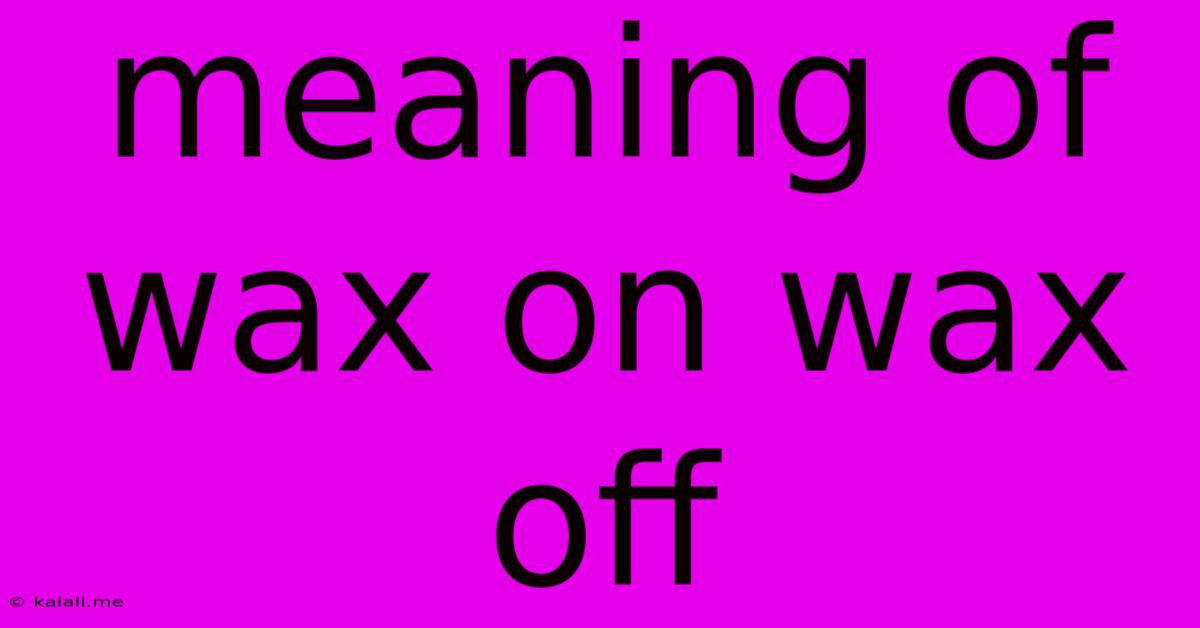Meaning Of Wax On Wax Off
Kalali
May 19, 2025 · 3 min read

Table of Contents
The Meaning of "Wax On, Wax Off": More Than Just a Karate Kid Phrase
The iconic phrase "wax on, wax off" from The Karate Kid has transcended the film itself, becoming a widely recognized idiom representing the often-hidden lessons in seemingly mundane tasks. But what does it truly mean, beyond the literal act of waxing a car? This article delves into the deeper meaning and explores its application in various aspects of life.
Metaphor for Skill Development: At its core, "wax on, wax off" is a metaphor for the process of skill acquisition. The repetitive motion of waxing Mr. Miyagi's car, seemingly pointless at first, subtly builds hand-eye coordination, focus, and discipline – all crucial elements for mastering karate. This translates to numerous life skills: practicing scales on a musical instrument, repeatedly solving math problems, or consistently practicing a sport. The seemingly tedious repetition builds fundamental skills, laying the groundwork for greater mastery.
Hidden Purpose and Patience: Mr. Miyagi's teaching method highlights the importance of patience and understanding that the "hidden curriculum" is often more valuable than the immediate task. The seemingly simple act of waxing contains a hidden purpose: training the student without explicitly stating the purpose, thus fostering a deeper understanding and appreciation for the process. This patience and delayed gratification are essential for long-term success in any endeavor.
Beyond the Karate Kid: Real-World Applications
The principle of "wax on, wax off" applies to various aspects of life, including:
-
Professional Development: Mastering a new software, learning a new language, or perfecting a presentation skill all involve repetitive practice. Each seemingly small step contributes to the overall mastery of the skill. This consistent effort, though seemingly mundane, builds expertise.
-
Personal Growth: Developing discipline, improving time management, or cultivating a positive mindset all require consistent effort and seemingly small, repetitive actions. Just like waxing the car, these small actions contribute to significant personal growth over time. Think of daily meditation, regular exercise, or consistent journaling.
-
Parenting: Teaching children responsibility often involves repetitive tasks, like chores. While these chores might seem unimportant, they build crucial life skills such as discipline, responsibility, and work ethic. The lesson of "wax on, wax off" emphasizes the importance of finding the hidden value in these seemingly mundane tasks.
The Power of Deliberate Practice
The essence of "wax on, wax off" aligns with the concept of deliberate practice. This involves focused, intentional practice aimed at improving specific skills. Unlike simply repeating an action, deliberate practice involves actively identifying weaknesses and working to improve them. It requires self-awareness, feedback, and a commitment to consistent improvement.
Conclusion:
"Wax on, wax off" is more than just a catchy phrase from a beloved movie. It's a powerful metaphor for the process of skill development, emphasizing the importance of patience, perseverance, and recognizing the hidden value in seemingly mundane tasks. By embracing this principle, we can unlock our potential and achieve mastery in any area of life. The seemingly simple act of repetitive practice, when done with intention and focus, can lead to extraordinary results. So, next time you face a seemingly tedious task, remember Mr. Miyagi's wisdom: "wax on, wax off," and discover the hidden potential within.
Latest Posts
Latest Posts
-
Why Do Monks Shave Their Head
May 20, 2025
-
Thunderbolt 2 To Usb Type C
May 20, 2025
-
Can You Bring A Magnet On A Plane
May 20, 2025
-
The Words I Speak Are Spirit And Life
May 20, 2025
-
Fallout 4 How To Get Out Of Power Armour
May 20, 2025
Related Post
Thank you for visiting our website which covers about Meaning Of Wax On Wax Off . We hope the information provided has been useful to you. Feel free to contact us if you have any questions or need further assistance. See you next time and don't miss to bookmark.